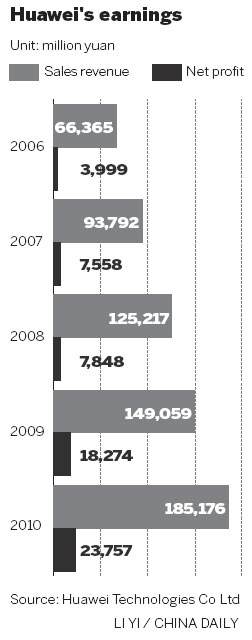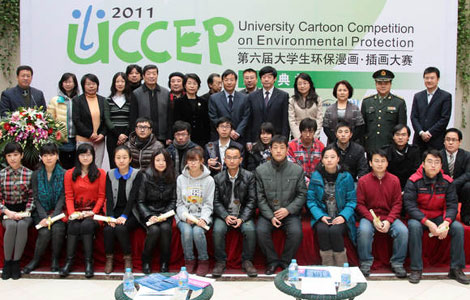Huawei begins CEO rotation to pave management succession
Updated: 2011-12-29 07:55
By Charlie Zhu and Yuntao Huang (China Daily)
|
|||||||||||
HONG KONG - Huawei Technologies Co Ltd, a $30 billion Chinese telecommunications equipment maker, has initiated a system to allow top executives to take turns to act as chief executive, according to the company's founder and CEO Ren Zhengfei.
The rotating CEO system is apparently aimed at paving the way for a smooth management handover from 67-year-old Ren, although it is unclear when he intends to retire, analysts said.
"Huawei is entering a post-Ren era," said Ji Yongqing, author of Huawei's World.
"Huawei hopes to realize a smooth and steady power handover from its founder and first-generation leaders to the second generation," Ji said.

Huawei, built from scratch by Ren into the world's No 2 telecommunications equipment maker, has never made public its management succession plan. The company is jointly owned by its employees and is not listed.
"The rotating system is better than sole reliance on a single person for the success of the company," Ren wrote in a year-end message to the company's 130,000 employees that has also been posted on major Chinese news websites.
The new structure requires a number of top Huawei executives, including Vice-Chairman Guo Ping and several executive directors of its board, to act as chief executive for six months at a time, according to the article by Ren and a source close to Huawei.
Ren, who revealed in the message that he twice underwent cancer surgery a few years ago, hopes the new system will help strengthen corporate governance as Huawei seeks to grow globally, analysts and the source said.
"The company is gearing up for further expansion. Under such circumstances, corporate governance has become extremely important," said the source, who asked not to be identified as he was not authorized to speak to the media. "That's why Mr Ren adopted such a management system."
A Huawei spokesman was not immediately available for comment.
Huawei, based in the southern boomtown of Shenzhen, competes with Samsung Electronics Co Ltd and Apple Inc in consumer electronics and with Ericsson AB and Cisco Systems Inc in telecommunications networking gear.
Huawei's sales grew 11 percent to 98.3 billion yuan ($15 billion) in the first half, with the company on track to hit its full-year sales target of 199 billion yuan.
Huawei has been seeking to expand in the US telecom sector, but has run into political opposition over national security concerns.
Ren's background with the Chinese military has often been cited as hindering the company's progress in North America, although Huawei has repeatedly denied it has links with the military.
The rotating CEO system replaced the "Executive Management Team" that Huawei initiated in 2004, under which eight company executives took turns on duties such as drafting documents and other operations, Ren said.
The new system provides the acting chief executives with much more authority, making them the virtual top leader during their tenures, according to Ren and the source.
"The acting CEOs pay more attention to the company's strategy ... and delegate more day-to-day decision-making authority to the company's various business groups in different regions," Ren said.
He attributed Huawei's success largely to the "solidarity" of its management and teamwork.
Ren said he chose to adopt a relatively low public profile not because he thinks highly of himself, but because he believes the company's success is based on collective leadership.
He expressed concern about the global economic outlook and its potential effect on the company.
"The economy is becoming increasingly beyond control. If the financial crisis deteriorates further ... can we remain intact? Are we capable of saving ourselves?" Ren said.
Reuters
- Huawei begins CEO rotation to pave management succession
- Nine employers arrested for withholding wages
- COFCO plans to expand global logistics system
- Agriculture still vital to China
- Agriculture a fertile field for investment
- Banks 'must prepare' for eurozone changes
- Risks to GDP growth rising
- Central SOEs' profits to 900b yuan










